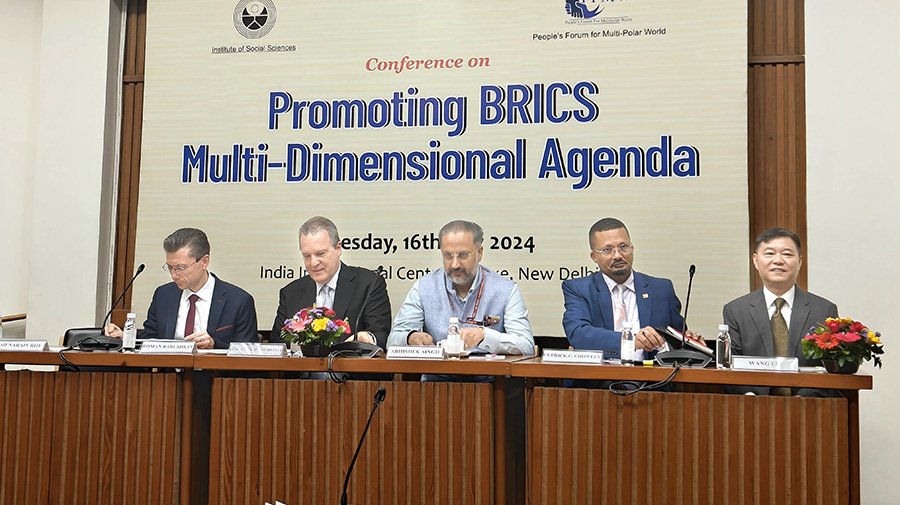
On July 16th, 2024, Shri Abhishek Singh, Joint Secretary (Economic Relations) at the Ministry of External Affairs (MEA), delivered a speech at the conference on “Promoting BRICS’ Multi-Dimensional Agenda,” hosted by the Institute of Social Sciences. His address underscored the multifaceted nature of BRICS cooperation and highlighted the collective efforts to address global challenges through this unique coalition of diverse nations.
Joint Secretary Singh emphasised that BRICS, established in 2009, represents nations with diverse political cultures and histories. “BRICS cooperation spans multiple dimensions—politics, security, economy, culture, and people-to-people exchanges,” he stated. This cooperation is built on principles of mutual respect, understanding, equality, solidarity, openness, inclusiveness, and consensus. These values guide BRICS’ collective endeavors and reflect the dynamism of the times.
Since its inception, BRICS has made significant contributions to global progress, positively impacting economic growth, social inclusion, and environmental protection. “The expansion of BRICS has further enriched our collaborative efforts, adapting to contemporary challenges and opportunities,” he noted. This growth is a testimony to the coalition’s ability to evolve and address the diverse needs of its member countries.
India’s steadfast commitment to a representative and multilateral global governance architecture was highlighted by him. “During India’s G20 presidency last year, a notable achievement was the inclusion of the African Union as a permanent member of the G20. This milestone reflects India’s dedication to inclusivity and global cooperation,” he said.
The guiding philosophy of “Vasudhaiva Kutumbakam”—the concept of the world as one family—articulated by Honourable Prime Minister Narendra Modi, was emphasized as a foundational principle for strengthening BRICS. “This philosophy informs India’s approach to economic growth, climate justice, counter-terrorism, and the reform of international institutions such as the UN Security Council,” he emphasised.
Addressing counter-terrorism, he highlighted its critical importance, particularly for nations like India that are frequently affected by cross-border terrorism. “The BRICS platform offers a valuable forum for tackling such pressing issues,” he stated. Reforming global decision-making processes is equally vital to ensure that international institutions reflect contemporary realities and challenges.
He also underscored the role of cultural exchanges and social engagement in strengthening BRICS bonds. “Social engagement through cultural exchange programs, academic collaborations, and people-to-people interactions strengthens our bonds and enhances global peace,” Shri Singh remarked.
Innovation and technological advancements are central to the BRICS agenda. “By leveraging our collective expertise, we can drive progress in science and technology, addressing challenges like climate change, healthcare, and digital transformation,” he said. Initiatives like the International Solar Alliance and the Coalition for Disaster Resilient Infrastructure, championed by Prime Minister Modi, are crucial in the collective fight against climate change.
Leave a Reply